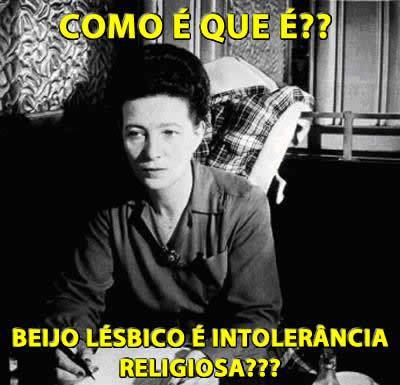[All links lead to Portuguese-language pages except when otherwise noted.]
Two young women were jailed by order of Brazilian congressman Pastor Marco Feliciano after kissing during the evangelical event Glorifica Litoral in the city of São Sebastião in the north of São Paulo on Sunday, September 15, 2013.

The kiss which resulted in the arrest of the two young women. Photo: YouTube
Feliciano, who is also a congressman and president of the House Commission for Human Rights and Minorities [en], stopped his presentation during the gospel festival, which bills itself as an “evangelical social-cultural week”, to request the municipal guards and military police officers present arrest the two young women.
“Those two girls have to leave here handcuffed. No use trying to run, guards are headed there now. This here isn't palace where anything goes, It’s the house of God,” he said into the microphone.
According to reports from those present at the event, while the women were being removed, the pastor continued to incite the crowd of 70,000 people against them.
The two young women, Yunka Mihura, 20, and Joana Palhares, 18, were taken by agents of the Municipal Civil Guard to the First District Police Station of São Sebastião, where the police chief filed the incident for investigation. The women alleged other heterosexual couples were also exchanging kisses during the event, and that they were physically assaulted by the police.
In the blog iGay, they stated that they had already kissed a few times during the event and that nobody seemed to mind. Yunka stated:
O evento era público, pago com o nossos impostos. Aquele palco, aquele microfone, tudo tinha dinheiro público. Também era um espaço aberto, na Rua da praia. Estar ali era direito nosso.
The event was public, paid for with our taxes. That stage, that microphone, everything was with public money. It was also an open space, on Beach Street. It was our right to be there.
According to the lawyer for the two women, Daniel Galani, there was a conflict of rights during the event:

The online community “Moça, você é machista” (Girl, you are a chauvinist) published an image questioning the act which lead to the arrest of the two young women. (Text reads: What's that?? A lesbian kiss is religious intolerance???)Photo: Facebook
A gente vê que foi uma situação que fugiu completamente ao controle. A gente sabe que existiam dois direitos em conflito: um é a liberdade de expressão e o outro a liberdade do ato religioso. Os dois direitos são constitucionais e estão previstos para que as pessoas possam fazê-los.
We see it as a situation that got completely out of control. We know there are two rights in conflict: one is the freedom of expression and the other the freedom of religious practice. The two rights are constitutional and are prescribed so that people can make use of them.
In statements to magazine Revista Fórum, the director of the Commission for Human Rights of the Brazilian Order of Lawyers (known by its acronym OAB – Ordem dos Advogados do Brasil) in São Paulo, Martim de Almeida Sampaio, considered the detention “illegal” and added the young women “could have called for the pastor's arrest for abuse of authority,” had they known about the Penal Code.
Without giving interviews to the press, Feliciano used his Twitter account to talk about the episode, citing the Brazilian Penal Code to justify his actions:
1) o código penal brasileiro no seu artigo 208 diz: Escarnecer de alguém publicamente, por motivo de crença ou função religiosa;
— Marco Feliciano (@marcofeliciano) September 16, 2013
1) Article 208 of the Brazilian Penal Code states: to mock someone publicly for reason of belief or religious function;
— Marco Feliciano (@marcofeliciano) September 16, 2013
2) impedir ou perturbar cerimônia ou prática de culto religioso; vilipendiar publicamente ato ou objeto de culto religioso:
— Marco Feliciano (@marcofeliciano) September 16, 2013
2) to impede or disturb a ceremony or practice of religious worship; publicly vilify acts or objects of religious worship:
— Marco Feliciano (@marcofeliciano) September 16, 2013
3) Pena detenção, 1mês a 1ano ou multa. P.U. Se há emprego de violência, a pena aumenta de 1/3, sem prejuízo da correspondente à violência — Marco Feliciano (@marcofeliciano) September 16, 2013
3) Punishment detention, 1 month to 1 year or fine. P.U. If violence is used, the punishment increases by ⅓, without prejudice to the correspondent violence
— Marco Feliciano (@marcofeliciano) September 16, 2013
The social network was also used against the pastor by opponents of his attitude. Marcelo Gerald, an LGBT rights activist, associated the incident with religious fanaticism:
O direito dos fanáticos religiosos está ultrapassando qualquer limite aceitável
— Marcelo Gerald (@mkGerald) September 17, 2013
The right of religious fanatics is surpassing all acceptable limits
— Marcelo Gerald (@mkGerald) September 17, 2013
And he stressed:
Sobre Feliciano só direi que ele precisa ser punido, NADA justifica a violência empregada contra lésbicas em espaço PÚBLICO, — Marcelo Gerald (@mkGerald) September 17, 2013
Regarding Feliciano I can only say he needs to be punished, NOTHING justifies violence used against the lesbians in a PUBLIC space,
— Marcelo Gerald (@mkGerald) September 17, 2013
Congressman Jean Wyllys, an advocate for LGBT rights and one of the main opponents of Feliciano in the House and on the Human Rights Commission, was attacked on his account by various users. He considered the arrest of the two young women to be an arbitrary act and stated:
Investigar a exploração comercial da fé e o charlatanismo essa polícia não faz! RT “@camilo_aggio: Viu isso, Jean? http://t.co/4z1iZoO0Kl”
— Jean Wyllys (@jeanwyllys_real) September 17, 2013
These police don’t investigate charlatanism and the commercial exploitation of faith! RT “@camilo_aggio: Have you seen this, Jean? http://t.co/4z1iZoO0Kl”
— Jean Wyllys (@jeanwyllys_real) September 17, 2013
During the week, video production company WAPTV Comunicação, contracted by the organization Glorifica Litoral, released a video defending the pastor. The company has among its clients the pastors Marco Feliciano and Silas Malafaia – noted by Forbes [en] as one of the richest pastors in Brazil.
The video claims to reveal the truth about the imprisonment of the two girls by stating that the event took place in a “closed space” and that it got its support from evangelical churches on the north coast of Sao Paulo state, not from public money like activists have said. Then it shows pastor Feliciano repeating the same legal arguments that are quoted above:
After becoming known thanks to racist and controversial statements, Feliciano is opposed by a good portion of the Brazilian political class since the beginning of his mandate as president of the Human Rights Commission. At the beginning of the month, the Brazilian Order of Lawyers announced that it will request, together with more than 20 entities linked with human rights, the expulsion of Feliciano as well as Congressman Jair Bolsonaro, for inciting hate crimes.
According to the municipal government of São Sebastião, the case against the two women will be investigated by the inspectors office of the Municipal Civil Guard.







9 comments
This event wasn’t held in a “closed space.” It was in a public space, on Beach Street, and everything was paid for with public funds. The stage, the microphone used by the pastor to demand the arrest of the young women, everything paid for with public funds. The constitution protects freedom or religion and freedom of expression. The charges against the women should be dropped and Feliciano should be charged.